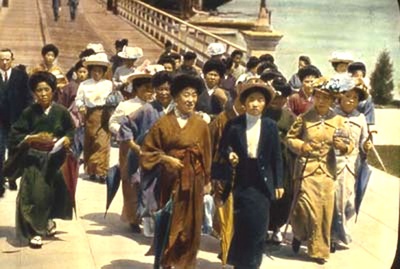This Thanksgiving, I broached a topic with my Japanese American cousins about a heritage issue they weren’t too familiar with.
Few Americans know that the Japanese historically has an underclass of untouchables similar to other Asian cultures like India. The “burakumin” are descendants of a feudal outcaste that worked in occupations handling dead bodies – butchers, leather workers – and considered unclean. They are indistinguishable in physical appearance from other Japanese, and live mostly in the western half of Japan. Even in Japan, it’s a hidden culture that makes for embarrassing public conversation, let alone media coverage. My wife who grew up in Tokyo knew very little about their existence.
The Burakumin have always lived a segregated existence because the government keeps family records based on residence that made escaping their heritage difficult. Their plight became publicized with the 1975 disclosure of a hand written book that disclosed the locations of burakumin ghettoes for use by Japanese corporate recruiters. Even this year, Google Earth caused an uproar in Japan by overlaying old maps that highlighted burakumin neighborhoods, which Google eventually doctored. The systemic societal ostracism accounts for estimates that 70% of Yakuza, the Japanese mafia, are burakumin.
Normally reticent Japanese now discuss the burakumin issue in the chat forums. Information suppressed for generations is disclosed (in Japanese) albeit under cloak of anonymity. There are inferences that many burakumin emigrated from Japan to the US in the early 1900’s as a natural cleanser to their tainted background. The old Hollywood meme of the Japanese gardener and florists in LA may have been started by burakumin who would tend garden at the castles (although it’s also said that non-burakumin Japanese also followed into the profession).
Burakumin were nameless during the feudal era that ended in the mid-1800s. Many were then given geographical or directional names. Burakumin ghettoes were located near rivers and higher up in less arable land. Yamaguchi means mountain mouth, and Olympic skater Kristi Yamaguchi is said to be burakumin.
The American Burakumin
What makes this interesting to Japanese Americans is the experience of the American Burakumin has almost no documentation. My 87 year old aunt says their status in San Francisco was known and my grandmother discouraged a relationship between a cousin and a known family. But that’s all. I think the socially liberal Japanese Americans didn’t give it a second thought.
Then I met a 70-year-old Japanese American woman last year who described in great detail two segregated cultures of Japanese Americans while growing up in Los Angeles. Brings up searing questions… why isn’t this documented? How did they co-exist when Japanese were shipped out to those WW2 internment camps? Was this downtrodden culture already too docile to put up a fight against relocation?
If you’re Japanese American, do you know if you’re a descendant of the burakumin? It’s possible that story never got told. Is there family lore that you’re descended from samurai? If so, might it be a whitewash tale? It’s an intriguing heritage issue.
I’ve created a posterous blog to try to document this at http://burakumin.posterous.com. Please tell your story. My wife tells me it could make Japanese uncomfortable.
* This article was originally published in Media Transparent on November 27, 2009.
© 2009 Patrick Kitano



